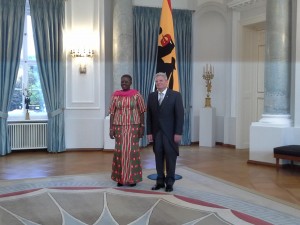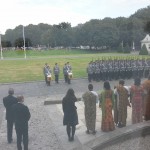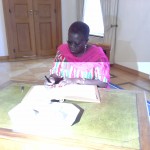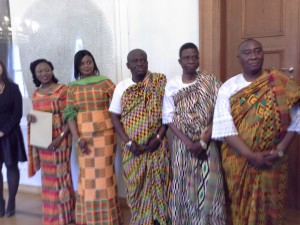
Her Excellency Ms Akua Sena Dansua, Ghana’s new Ambassador to Federal Republic of Germany on Thursday presented her Letters of Accreditation to President Joachim Gauck at a ceremony at Castle Bellevue in Berlin.
Ambassador Sena Dansua and her delegation were welcomed by a detachment of the German Armed Forces at the forecourt of the Castle after which she proceeded to sign the Official Guest Book.
The Ambassador was then led by officials from the Presidential office as well as protocol officers from the German Foreign Office to the reception Hall of the President where the presentation took place.
After introducing members of her delegation to President Gauck, an official photo was taken.
President Gauck and Ambassador Sena Dansua held talks behind closed doors believed to centre on regional and African issues. The meeting, which lasted longer than anticipated, was an indication, says observers, of the President’s keen interest on developments in Ghana, regarded as one of the most peaceful and stable countries in Africa with strong and vibrant democratic credentials.
Germany and Ghana have traditionally enjoyed friendly and wide-ranging political and diplomatic relations.
Excellent relations between the two countries remained vibrant under different Ghanaian governments since the beginning of Ghana’s democratization process based on the 1992 constitution.
German engagement in Ghana is very wide-ranging. German bilateral development cooperation focuses on sustainable economic development, decentralisation, agriculture, renewable energy and good financial management.
Cultural intermediaries – such as the Goethe Institute, but also including institutions like the German-Swiss International School and the German Academic Exchange Service – promote scientific, academic and cultural exchange between the two countries.
Of Germany’s political foundations, the Friedrich Ebert Foundation, the Konrad Adenauer Foundation, the Hanns Seidel Foundation and the Friedrich Naumann Foundation have their own local offices in Ghana.

Church-affiliated organisations (among them Misereor and the Church Development Service) are active in areas including rural development and vocational training.
There is cooperation between the Federal Armed Forces and the Ghana Armed Forces. Germany is also engaged in efforts to develop and stabilise regional security structures, e.g. through the support provided by the Kofi Annan International Peacekeeping Training Centre (KAIPTC).
For a number of years now, peacekeeping and crisis prevention have been gaining importance in bilateral relations. Germany was instrumental in setting up KAIPTC ten years ago. Germany is helping the KAIPTC to train troops for deployment in United Nations (UN) and African Union (AU) peacekeeping missions. In addition, Germany is helping Ghana to build an engineer regiment as part of the planned AU/ECOWAS Rapid Reaction Force.
German experts are also active in a number of areas outside “classical” development cooperation. To give just three examples: they are engaged in digitalising the state radio station’s archives; they are helping to transform a private university into Africa’s first ecological university; and they are responsible for producing Ghana’s new geological map.
Germany is the second most popular travel destination in Europe for Ghanaians, after the United Kingdom. This is due in large part to the relatively large number of Ghanaians (at least 50,000) living in Germany. Ghana holds Germany in high regard as a highly advanced country with considerable political influence worldwide and also as an important partner in development cooperation. In terms of democratic principles, good governance, the rule of law, the protection of human rights and domestic stability, Ghana is regarded by Germany – and other countries – as a model on the African continent.
Economic cooperation
Over the past years, there has been an upward trend in economic relations between Germany and Ghana. They have gained momentum particularly in recent years as the demand for German technology for Ghana’s diversifying economy has increased. During his visit to Ghana on 19 January 2011, State Secretary at the Federal Ministry of Economics and Technology Bernd Pfaffenbach opened the Office of the Delegation of German Industry and Commerce. It shares premises with Germany Trade & Invest (gtai), which has had a correspondent working there since the beginning of 2014. In addition, the German-Ghanaian Economic Association (GGEA) has for years been performing valuable services for German companies operating in Ghana or keen to gain a foothold there.

The Deutsche Investitions- und Entwicklungsgesellschaft (DEG), which has had its own office in Ghana since the beginning of 2008, offers support to small and medium-sized companies in particular.
An indication of what the future of bilateral economic relations might look like was provided by an international conference on the opportunities and challenges for renewable energy, recycling und sanitation management. The 2012 West African Clean Energy and Environment Exhibition and Conference (WACEE), which was organised by the Ghanaian-German Economic Association, has now, for two consecutive years, been accompanied by a well-attended trade fair featuring some 70 exhibitors. WACEE has thus established itself not only as the most important environmental and energy fair but also as the largest (and most international) business trade fair in the whole of Ghana.
Development cooperation
German development cooperation with Ghana focuses on the following priority areas:
- decentralisation (advice on drafting policies and their implementation on a decentralised basis, local-level funding)
- agriculture (advice on drafting policies, production and marketing, rural funding)
- sustainable economic development (in particular financial sector development and vocational training)
In addition, Germany is one of a group of ten donors providing multi-donor budget support and controlling this through a working group that has an important function overall within international donor community. This is accompanied by a programme on good public financial management. In the coming years, Germany will also step up its energy promotion activities (renewables, transmission lines).
Since 1961, Germany has provided a total of EUR 1.37 billion for development cooperation with Ghana. In 2012, Germany pledged another approximately EUR 170 million for the next three years. The relevant programmes are being implemented by the Federal Ministry for Economic Cooperation and Development (BMZ) and other government agencies including the Federal Foreign Office, the Federal Ministry of Education and Research and the Federal Environment Ministry, as well as the federal state of North Rhine-Westphalia and the City of Bonn. Direct funding is also being provided by non-governmental organisations as well as support for a number of regional projects in the agricultural, climate, energy and health care sectors (e.g. for the above-mentioned WASCAL centre). In addition, Germany is heavily involved in European Union programmes in Ghana and provides active support to the country as an important member of various international organisations (including the World Bank, the International Monetary Fund, the African Development Bank and the International Fund for Agricultural Development).

There is strong donor harmonisation in dialogue on development cooperation, the Paris Declaration on Aid Effectiveness and the subsequent so-called harmonisation conferences (the most recent held in Busan in 2011) establishing the required coordination structures. Based on Ghana’s national Growth and Poverty Reduction Strategy (GPRS II), in 2012 14 locally represented donors reached agreement, in the so-called Compact for Leveraging Partnership for Shared Growth and Development over a ten-year period (2012-2022), on a joint analysis of the country’s development challenges, on key sectors and priorities and on ways and means for the donor community to help Ghana achieve its development goals. Coordination and sectoral dialogue are mainly conducted in sector-specific expert groups.
The experts engaged in projects and programmes as part of Financial Cooperation (KfW Development Bank) and Technical Cooperation (Deutsche Gesellschaft für Internationale Zusammenarbeit, GIZ) include nine so-called integrated experts working in Ghana under the Centre for International Migration and Development (CIM) programme as well as 24 development aid workers.
Cultural relations
Cultural relations between Ghana and Germany are very broadly based and wide-ranging. A Goethe Institute branch has been active in Accra for over 50 years with numerous wide-ranging programmes. Besides language teaching, it organises attractive events ranging from the fine arts to music and dance to literature and film. Also active locally are the German Academic Exchange Service (DAAD), which organises exchanges for students and teachers and promotes the German language, the German broadcaster Deutsche Welle, the Alexander von Humboldt Foundation and church missions, whose activities focus on education and health care. Since the 2012/13 school year, the former German-Swiss International School (GSIS) in Accra has been a German School Abroad funded exclusively by the Federal Government. Besides coordinating the work of these cultural intermediaries, the German Embassy is engaged in cultural preservation and the running of numerous scholarship and further-education programmes. As part of the Federal Foreign Office’s partner schools initiative, the Accra Academy in Accra and the Wesley Girls Academy and the Opoku Ware School in Kumasi receive support in their efforts to promote the German language.
Regular joint Franco-German cultural events are held in Ghana. In 2013, the year in which the Elysée Treaty celebrated its 50th anniversary, a number of high-profile events were held involving school students, a large reception and a Franco-German gala concert.
Football is extremely popular in Ghana. Many Ghanaian footballers play for German clubs. A football highlight was Ghana’s participation in the 2006 FIFA World Cup in Germany. Not only did this bring the Black Stars success in being voted the best African team, it also boosted feelings of enthusiasm and mutual goodwill in the two countries.
Germany helped Ghana’s women’s football team to prepare for the 2011 FIFA Women’s World Cup in Germany. The U-20 national team, the Black Maidens, made a three-week training trip to Germany in September 2008. Ghana has also sent a number of football coaches to the German Football Association’s sports academy at Hennef and a German boxing coach has been seconded to Accra. In 2012, the German Embassy once again presented numerous donations of equipment to Ghanaian sports clubs and schools.
Mellisa Sheriddan, ANA Diplomatic Editor and Musah Ibrahim Musah
